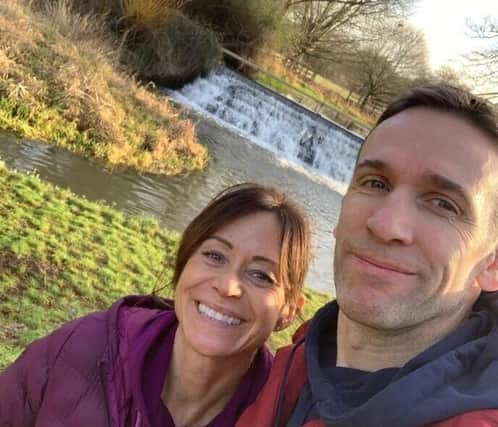Banbury man campaigns on little-known stroke risk after succumbing at just 51-years-old


Almost three in four people do not know that an irregular heartbeat is a major cause of strokes. This Thursday - Stroke Prevention Day – Will Brooks of Banbury is adding his story to publicity in a bid to educate people about the risk of Atrial Fibrillation (AF).
AF is linked to around one in five strokes – 40 strokes per day. And strokes in people with AF are more severe and more likely to result in death or serious disability.
Advertisement
Hide AdAdvertisement
Hide AdMr Brooks, of Oxford Road, is encouraging others to keep an eye on their heart rate and any breathlessness following his stroke that was caused by AF.


A keen and fit runner, he was at home working in July 2020 when he discovered his right arm was dead. After his wife, Carrie, called for an ambulance, she and her daughter Chloe knew the signs of stroke and made the emergency services aware.
Doctors soon confirmed Mr Brooks’ stroke and shared that he may not be able to walk or talk properly again.Mr Brooks said: “It was amazing how fast they had me on a stretcher and travelling to hospital. The news from the hospital was not good and there was a chance that I wouldn’t be able to walk or talk properly again. It was so worrying for me and my family.”
When he woke he was very tired and unable to speak properly, only being able to say the word, ‘yes’. Thankfully though the effect of his stroke wasn’t as severe as first feared and he was soon let out of hospital.
Advertisement
Hide AdAdvertisement
Hide AdThe initial cause of Mr Brooks’ stroke was unknown but after fitting a heart monitor, doctors discovered he had Atrial Fibrillation in the years before his stroke. While an operation to widen a vein in his heart in August 2021 didn’t bring his heart rate back under control, a second operation in September 2022 thankfully made all the difference.
He said: “After the second operation I just felt so much better and my resting heart rate returned to normal. I was even able to run a mile a minute faster. Mentally I also felt so much better.”As part of Stroke Prevention Day, Mr Brooks now wants to highlight the importance of keeping an eye on AF.“People were really shocked when I had a stroke as I was so fit and healthy – always running and previously playing rugby. However, the more exercise I did the more out of breath I would get. If I knew what I know now, I would have got it checked out straight away. I haven’t got AF anymore and that’s all thanks to the operations,” he said.“I didn’t know I had AF until I had my stroke so if you feel like you’re getting out of breath or getting a faster heart rate for no obvious reason, then please go and get yourself checked out.”
A survey by Stroke Association to mark Stroke Prevention Day revealed that 73 per cent did not know that AF is a major cause of stroke.
The Association and BBC Morning Live’s Dr Punam Krishan are urging people to check for this ‘silent condition’ which is one of the leading causes of serious strokes, after a survey showed how few are aware of the link.
Advertisement
Hide AdAdvertisement
Hide AdIt is estimated around half a million people are living with undiagnosed atrial fibrillation (AF), where the heart beats with an irregular rhythm. When this happens, the heart won’t empty all of the blood out of its chambers with every beat and the leftover blood can form clots which travel to the brain, blocking off blood flow and causing a stroke.
Nick O'Donohue, Associate Director for the South East, at the Stroke Association, said: “It's worrying that so few people know that a little thing like how your heart beats can lead to a massive stroke.
“AF often has no symptoms and a stroke can strike without warning. Don’t let the first sign of your AF be a sudden and life-changing stroke. With early diagnosis and effective management of AF, your risk of a stroke dramatically decreases so it’s vital to get checked regularly.
“It’s really easy to check your own pulse and our research told us that most people are able to. Feel for your pulse on your wrist or neck to make sure it has a regular beat. If you suspect you have an irregular pulse, contact your GP practice.”
The survey also revealed that:
Advertisement
Hide AdAdvertisement
Hide AdSix in ten (62%) said they had never checked themselves for AFAlmost half (44%) said they had never been checked for AF by a healthcare professionalMore than eight in ten (83%) said they would be likely to seek medical advice if they felt something was wrong with the rhythm of their heartbeat/pulse55% said they knew someone who had had a stroke26% knew someone who had had AF.
The charity has a video guide on its website at www.stroke.org.uk/spd23 showing people how to check their own pulse on their wrist or neck.Dr Krishan, a Glasgow GP, said: “The good news is that if AF is identified it can be managed really easily. If you’ve got AF, you might be given anticoagulant medication to reduce your risk of stroke by making a clot less likely to form, or you might be able to have a one-time electric pulse to get your heart beating regularly.
“The most important thing is to check yourself and contact your GP if you think you might have AF. It’s so much better to get your AF sorted before it becomes a problem.”
More information about AF is available on the Stroke Association website here.